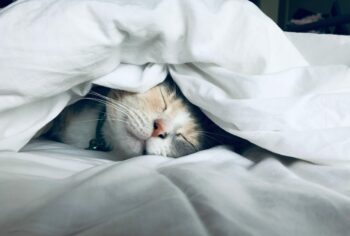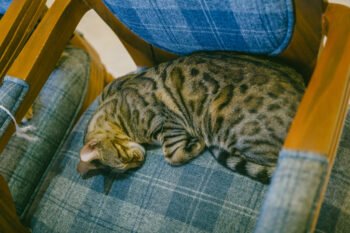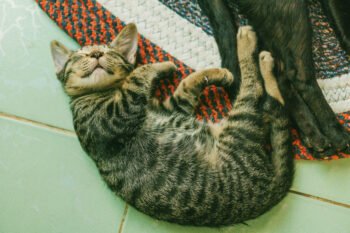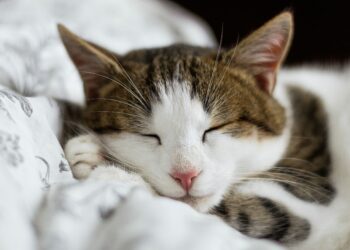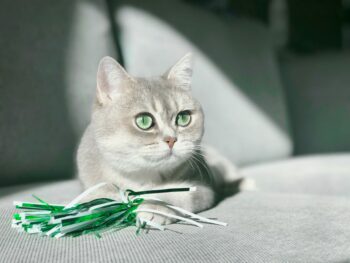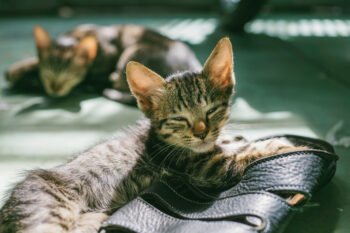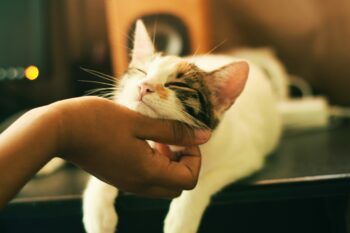The winter holidays are fast approaching, and with them the inevitable pressure to get so much accomplished. We humans have developed coping mechanisms for the rush of shopping, cleaning, baking and entertaining family and friends, but the resulting chaos–even though it’s joyful–can take its toll on our feline companions. How can you ensure that your cat comes through this happy but chaotic season with minimal trauma? With some planning, you can share both the joy and the peace with your cat, while avoiding a great deal of the stress.
Some cats insist on “grazing” on new plants in the house. But some of the most beautiful symbols of the season, such as mistletoe, holly berries and poinsettia, can be poisonous if swallowed. In some instances, ivy can cause diarrhea, convulsions, and even death if eaten in large amounts. Hang decorative holiday plants out of reach, and remember that even high countertops are easily scaled by a determined cat.
If you expect legions of visitors to your home, consider their effect on your pet. During the holiday festivities, the noise from additional family members and visitors can get very loud and confusing for even the friendliest cat. Make sure to provide a quiet and relaxing place so your pet can get away to rest and not be disturbed.
When stressed or anxious, cats often begin to urinate or defecate outside the litter box. Such behavior rarely stops on its own, and can become habitual. To anticipate and avoid litter box problems, be especially careful to provide multiple litter boxes in easily accessible (and “safe”) areas. Scooping urine and feces from all boxes at least once a day will help to avoid problems.
Does your cat tend to hide whenever you have guests? Fearful cats may grow more anxious during the holiday season, leading to litter box accidents or even aggression in some cases. If you feel uncertain or uneasy about your cat’s response to visitors, consider restricting her to a safe, comfortable and familiar room such as your bedroom. Provide an extra litter box and food and water bowls for her to use as she chooses.
Don’t feed your pet chocolate. While pets do love holiday treats, chocolate is very toxic for them. Chocolate is a stimulant and in large amounts may cause increased heart rate, irregular heart beat, loss of appetite, excessive water intake, vomiting and even seizures. If your cat shows any of these signs, please contact your veterinarian immediately.
Christmas trees, with their lights and hanging ornaments, may resemble giant jackpot cat toys to your pet. Most hazardous are long string-like objects such as tinsel and popcorn trimmings. If tinsel or string is swallowed, it can lead to serious intestinal injury and even death. Leave the tinsel packed away and using safer ornaments to trim the tree.
Help avoid your cat’s “tree temptations” by covering your holiday tree stand with a tree skirt. Prickly pine needles can get lodged in your pet’s esophagus, making it painful to swallow. Even drinking water from the tree base can cause your cat to experience diarrhea, mouth sores, vomiting and loss of appetite.
Small lights strung on a tree, particularly if they are blinking, can invite batting and even chewing from playful cats. If your cat pays a lot of attention to the lights or shows any interest in mouthing the wires, be sure to supervise her while near the tree and unplug it when you’re not in the room.
To avoid the risk of fire from being knocked accidentally, candles should always be placed safely out of reach of your cat.
As office parties and last-minute shopping take you away for longer hours, consider the effect on your cat’s daily schedule. Potential problems may include urination and defecation outside the litter box or conflicts among the cats in your home. Try your best to minimize the change to your cat’s day-to-day life.

